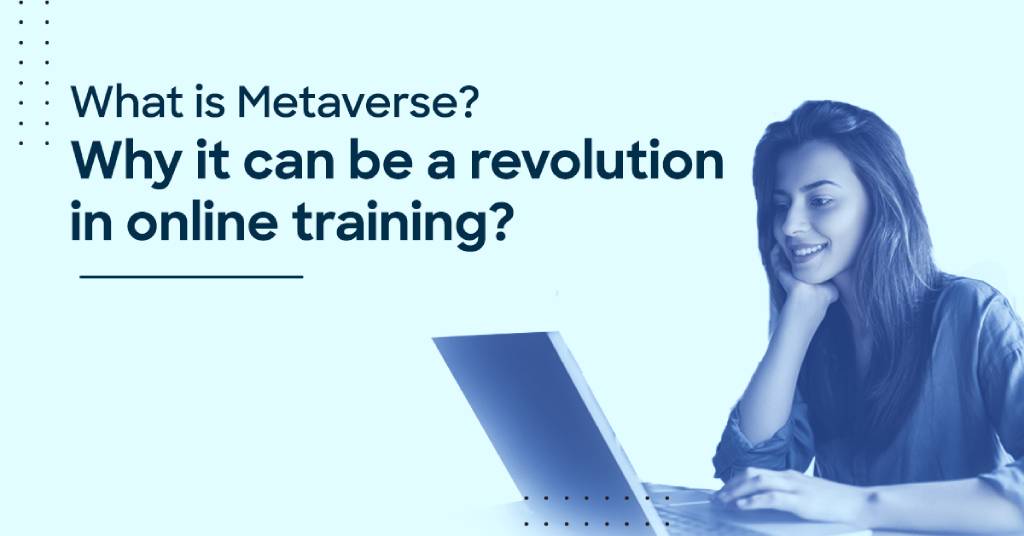What is Metaverse? Why it can be a revolution in online training?

There has been a growing convergence of the financial, digital, and physical worlds. Our devices enable us to access almost anything at a moment's notice. Multiple virtual spaces are combined in a persistent, online, 3D environment in a Metaverse. It could be considered the next evolution of the internet. Within the Metaverse, users will be able to share 3D spaces, interact with each other, and work together.
What is the Metaverse?
In the Metaverse, users are connected in a virtual, online space in every aspect of their lives. An example would be a platform that connects multiple technologies, similar to the internet, where different websites can be accessed through one web browser.
The Metaverse will serve as a platform for social networking and gaming and house a digital identity system, a decentralized governance system, and other applications. Today, users create and obtain valuable items and currencies that help build a unified, single Metaverse. This combination of features gives blockchain its potential as a technology for the future.
Why can it be a revolution in online training?
Some schools and universities have already adopted augmented and virtual reality to aid their students in learning. VictoryXR is a stellar example of this. They have created fully digital campuses that use virtual reality to create virtually realistic environments. Through this tool, students can step into organs and interact with molecules. They can also produce chemical compounds on a molecular level to enhance their understanding of chemical or biological processes.
Educators have significantly benefited from the use of VR and AR technology. But. Students may benefit from these additional teaching and learning experiences in a virtual environment. This, however, does not constitute a Metaverse.
There is no persistent online platform for virtual education. Interoperability between worlds is not possible, and few of them include the notion of user-generated content. Then, what could occur if we introduced these aspects of the Metaverse into an educational environment? And what might it imply for learning and development?
An Accessible and Collaborative VR Training Platform
The learning objectives of many companies overlap with those of other companies. A customer experience protocol and specific learning objectives, such as repairing proprietary hardware, are included. This allows for creating a Metaverse app that can be shared across numerous industries and companies due to overlapping objectives.
Multiple learning and development professionals could work together with the help of a Metaverse app. Through the system, they would be able to establish a centralized location for all types of virtual, online training programs for professionals. It is possible to retain company-specific processes; however, specific functions that are industry-specific can also be created, modified, and standardized.
A community such as this would exist exclusively online. The result is that trainees, no matter where they are in the world, can access content with the same level of engagement, if not more, as real-world exercises.
However, why stop at professional training and development? By making it freely accessible, even more, people will be able to share their practical online training experiences. Want to change a tire or change your headlights? A simple YouTube video will soon be transformed into a fully interactive virtual reality experience. The nature of knowledge exchange will be altered significantly.
Making a Living by Learning
Having undergone company training, an employee becomes a much more valuable employee and actively supports the company's growth. DAOs (Decentralized Autonomous organizations) recognize this and incentivize their users to gain deeper insight into the organization by compensating them. Typically, users are paid in the form of tokens with their value.
Metaverse organizations are incentivized to train their users. The initiative will enable them to generate content in the Metaverse, contribute to the development of Metaverse-based applications, and ultimately assist in its growth. Today, digital asset organizations use "learn to earn" programs in which participants earn points by completing courses that introduce new concepts.
One example is RabbitHole, which pays users who are active in using and understanding its platform. The platform enables users to learn how RabbitHole and its cryptocurrency network operate while simultaneously allowing them to earn cryptocurrency. As a result, RabbitHole acquires new users who are knowledgeable about its products and receive a percentage of revenue from the facilitated interaction between them.
Hiring Systems with Advanced Technology
With DAOs (Decentralized Autonomous Organizations), tracking individual experiences within an organization will become interoperable in the future. Utilizing such systems eliminates the need for job searching, screening, and interviews. The systems will be able to predict the most suitable person for specific positions within an organization. It will provide the required tools to allow them to begin contributing to the organization's success.
The development and repurposing of new training modules could be based on the experience and background of the individual. Today, more than ever, trainees must have the opportunity to participate in their training, creating a stronger sense of ownership and empowerment. As a result of this technology, L&D can be provided without having to change every aspect of the process.
How will the Metaverse Develop in the Future?
In support of creating a unified Metaverse, Facebook has been a prominent voice. Zuckerberg has explicitly stated his intention to take advantage of the Metaverse project to benefit remote workers and develop financial opportunities for those living in developing nations. Facebook is uniquely positioned to merge the worlds of social media, communication, and cryptography into one cohesive entity through the ownership of these platforms. Microsoft, Apple, and Google are among other large tech companies seeking to create a Metaverse.
Final Thoughts:
Gyrus is currently experimenting with this technology. There still are some challenges yet to be overcome before the Metaverse becomes widely adopted. As much as the gaming industry is excited about this technology, there is still a long way to go before impacting other forward-looking sectors. The Metaverse is expanding every day, defining the course of many industries, as well as the entire world.





-overview-(2022)-gyrus450.jpg)



